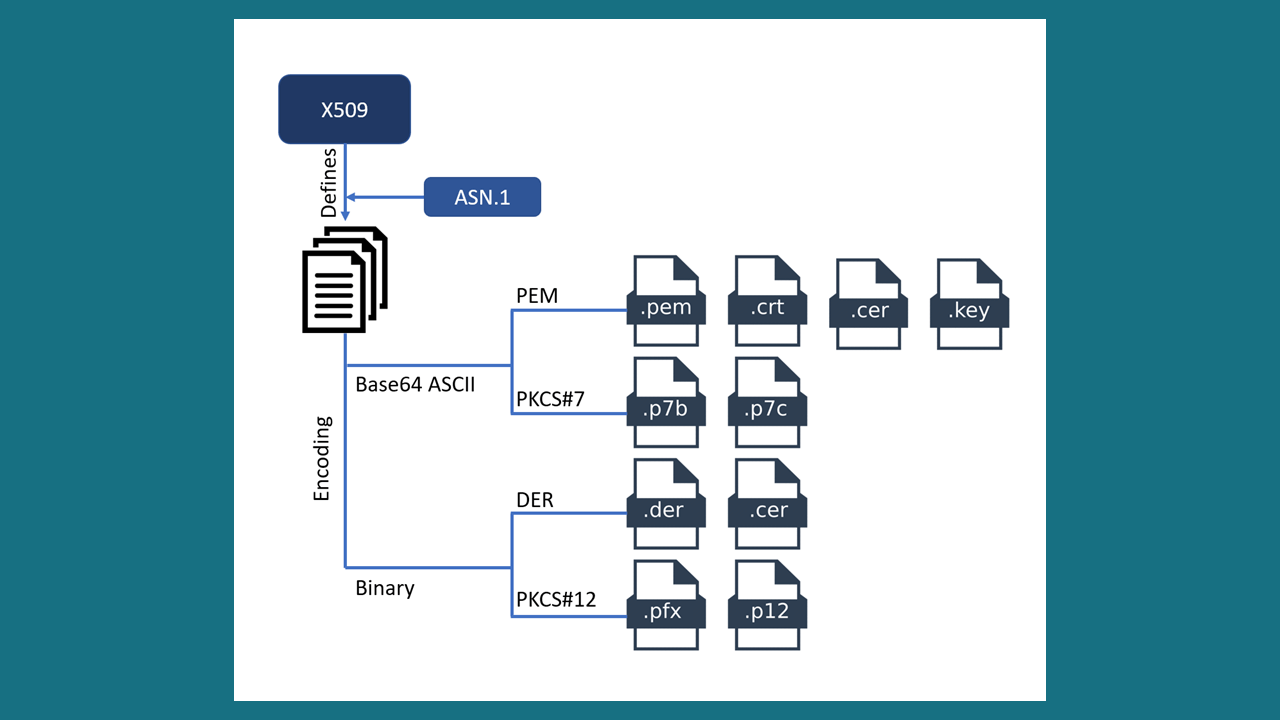SSL Certificate
What is SSL Certificate
An SSL Certificate is essentially an X.509 certificate. X.509 is a standard that defines the structure of the certificate. It defines the data fields that should be included in the SSL certificate. X.509 uses a formal language called Abstract Syntax Notation One (ASN.1) to express the certificate’s data structure.
There are different formats of X.509 certificates such as PEM, DER, PKCS#7 and PKCS#12. PEM and PKCS#7 formats use Base64 ASCII encoding while DER and PKCS#12 use binary encoding. The certificate files have different extensions based on the format and encoding they use.
The X.509 Certificate’s encoding formats and file extensions

Web Servers and SSL certificate formats
Tomcat: Keystore (.jks) with PKCS#7 (.p7b) Format
Apache: PEM (.crt+.key)
Nginx: PEM (.pem+.key)
IIS: PKCS#12 (.pfx)
JKS: Keystore
Generate a Self-Signed Certificate
OpenSSL
# interactive |
Enter PEM pass phrase: |
# non-interactive and 10 years expiration |
openssl req
PKCS#10 X.509 Certificate Signing Request (CSR) Management.
Required options
-x509: Output a x509 structure instead of a cert request (Required by some CA’s)-newkey val: Specify as type:bits. (key algorithm and key size). For example,-newkey rsa:4096-keyout outfile: File to send the key to (private key)-out outfile: Output file (certificate)-days +int: Number of days cert is valid for-*: Any supported digest. For example,-sha256
Optional options
-nodes: Don’t encrypt the output key.-subj val: Set or modify request subject. (non-interactive). For example,-subj "/C=XX/ST=StateName/L=CityName/O=CompanyName/OU=CompanySectionName/CN=CommonNameOrHostname"
Extract Public Key From SSL Certificate
OpenSSL
openssl x509 -pubkey -in cert.pem -noout -out public_key.pem |
openssl x509
X.509 Certificate Data Management.
Options
-pubkey: Output the public key-in infile: Input file - default stdin-out outfile: Output file - default stdout-noout: No output, just status. (Don’t append certificate to output public key file.)
Verify public key and private key
Creating a signed digest of a file:
openssl dgst -sha512 -sign private_key.pem -out digest.sha512 file.txt |
Verify a signed digest:
openssl dgst -sha512 -verify public_key.pem -signature digest.sha512 file.txt |
Convert SSL certificate formats
OpenSSL
OpenSSL Convert PEM
Convert PEM(.pem) to DER(.der)
openssl x509 -outform der -in certificate.pem -out certificate.der |
Convert PEM(.cer) to PKCS#7(.p7b)
openssl crl2pkcs7 -nocrl -certfile certificate.cer -out certificate.p7b -certfile CACert.cer |
Convert PEM(.crt) to PKCS#12(.pfx)
openssl pkcs12 -export -out certificate.pfx -inkey privateKey.key -in certificate.crt -certfile CACert.crt |
OpenSSL Convert DER
Convert DER(.cer) to PEM(.pem)
openssl x509 -inform der -in certificate.cer -out certificate.pem |
OpenSSL Convert P7B
Convert PKCS#7(.p7b) to PEM(.cer)
openssl pkcs7 -print_certs -in certificate.p7b -out certificate.cer |
Convert PKCS#7(.p7b) to PKCS#12(.pfx)
openssl pkcs7 -print_certs -in certificate.p7b -out certificate.cer |
OpenSSL Convert PFX
Convert PKCS#12(.pfx) to PEM(.cer)
openssl pkcs12 -in certificate.pfx -out certificate.cer -nodes |
Java Keystore
keytool -genkeypair: to generated a key pair and a self-sign certificate in a keystore file
keytool -genkeypair -keysize 1024 -alias herong_key \ |
What is your first and last name? |
Import
-importcert/-import
// Installing the Self-Signed Certificate on the Client |
-importcert -trustcacerts
// Importing a CA-Signed Certificate |
Export
-exportcert/-export: to export the certificate in DER format.
keytool -exportcert -alias herong_key -keypass keypass \ |
-exportcert -rfc: to export the certificate in PEM format.
keytool -exportcert -alias herong_key -keypass keypass \ |
Copy
Move SSL Certificate to another JKS Keystore
"C:\Program Files\Java\jre7\bin\keytool.exe" -importkeystore -srckeystore "D:\source-keystore.jks" -destkeystore "D:\destination-keystore.jks" -srcstorepass password -deststorepass password -srcalias "www.mysecuresite.com" |
References
OpenSSL
SSL Certificate
Conversion
Java Keystore
- The keytool Command
- Creating, Exporting, and Importing SSL Certificates
- “keytool” Exporting Certificates in DER and PEM
Nginx
Tomcat